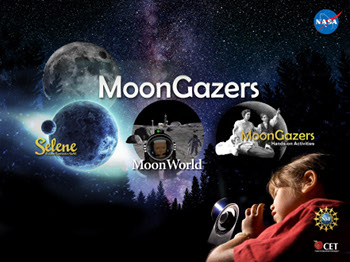
Selene Earns Honors, Meets National Agenda
Wed Jul 27 2011
The Selene videogame created by the Center for Educational Technologies has earned some top-notch recognition for its leading edge approach to teaching and learning.

MoonGazers illustrates how students begin to learn lunar concepts with the Selene game, practice them further in the MoonWorld virtual world, then apply them through hands-on activities in observing the moon.
"Your first submission in 2008 was very memorable, and the committee believes your submission for Selene II was exceptional, earning you your second D&D award," wrote Monica Tracey, chair of the AECT's D&D Outstanding Practice Award committee in the award notification.
Also this summer, Robin Anglin, science coordinator for the West Virginia Department of Education, reviewed Selene and certified that the game aligns with a number of West Virginia state standards and may be used as part of instruction.
"The Selene game does provide opportunities for students to engage in computer simulations as they explore science concepts addressed in the WV curriculum and may be used as part of the instruction for those objectives," Anglin wrote.
"This recognition is very important," said Dr. Debbie Denise Reese, senior educational researcher at the Center for Educational Technologies and leader of the CyGaMEs project. "We're on the cutting edge of cyberlearning using instructional games with this project. The technology we've developed in Selene to assess when players are learning a concept—we can now tell the exact moment when learning occurs, in fact—addresses the agenda set by the U.S. Department of Education in its 2010 National Education Technology Plan. They've asked for it—we're actually doing it here at Wheeling Jesuit."
Reese pointed out that the Selene game is free online and available 24-7. Players ages 9-18 and adult recruiters who confirm players' ages, get parental consent and gather other players are always needed to help with the CyGaMEs research. To sign up as a recruiter or play Selene, visit the Selene website or contact selene@cet.edu.
Selene: A Lunar Construction Game was funded by NASA to study how to best use videogames in the teaching of NASA science concepts. The game is now part of the National Science Foundation-funded CyGaMEs project, an approach to instructional game design and embedded assessment and was recently approved for its year four funding. It is part of the NASA-funded MoonGazers suite of activities designed to teach students about the wonders of the Moon right from their backyard.
"Kids play Selene to learn the science," Reese said, "then they take that knowledge and share it at home with their family and friends as they observe the Moon from their own driveways. It's not just a classroom exercise. Selene helps kids take natural phenomena and engage in it as part of everyday living."
In Selene players learn difficult geological concepts like accretion, differentiation, impact cratering and volcanism by applying these science concepts to help players move toward the game's goal of building the Earth's Moon. Players construct the Moon, then pepper it with impact craters and flood it with lava to experience how our Moon formed and changed over time. All through the game Selene tracks each player's behavior to measure learning and the player's response to the game environment.
Last year Selene was one of 15 finalists worldwide in the Disney Research Challenge, a competition that seeks to show that sophisticated concepts can be conveyed via entertaining interactions on computers.



